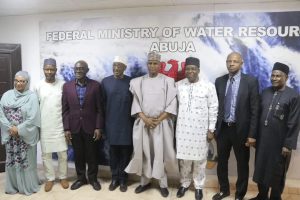
Alhaji Bello Goronyo, the Minister of State for Water Resources and Sanitation, on Friday reiterated the Federal Government’s commitment to collaborating with key stakeholders to restore Jabi Lake.
The announcement came to light during a comprehensive progress report presentation which held in Abuja.
Expressing deep concern over the diminishing eco-hydrological value of Jabi Lake, Goronyo attributed the decline to encroachments by miscreants and vandals.
Stressing the urgency of halting unauthorised activities threatening the lake and its ecosystem, the Minister emphasised the need to preserve it for future water needs.
During the presentation, Goronyo shed light on the challenges faced by the Eco-hydrology research team, citing increased building structures around the lake as hindering access to its shorelines.
He assured stakeholders of the government’s unwavering commitment to reaching out and collaborating to address these threats and safeguard Jabi Lake.
Prof. Emmanuel Adanu, Chairman of the Regional Center for Integrated River Basin Management (RC-IRBM), underscored the importance of addressing identified threats and security challenges in the Jabi area.
Dr Sani Ahmed, Coordinator of Training and Education at RC-IRBM Project Desk Office, provided updates on research and capacity building in Eco-hydrology and Integrated Water Resources Management (IWRM) on Jabi Lake.
Highlighting escalating threats due to rapid urbanisation and socio-economic activities, Ahmed emphasised the adoption of eco-hydrology as a crucial strategy for reviving the Lake.
He stressed the potential for gaining valuable insights into threats confronting the water body and developing effective approaches to mitigate them.
Ahmed revealed that embracing eco-hydrology for Jabi Lake would effectively tackle Water Resources Management challenges impacting the lake and its surrounding ecosystems.
Additionally, it becomes instrumental in safeguarding and preserving vital water resources to meet future demands, he said.
Considering the lake’s role as a habitat for migratory birds, Eco-hydrology practices aim to preserve the lake’s ecosystem and establish Jabi Lake as a model for eco-hydrology in Nigeria, supported by UNESCO.
Chosen as Nigeria’s first eco-hydrology demonstration site, Jabi Lake faces threats that demand collaborative efforts for conservation.
The Eco-hydrology programme, supported by UNESCO, aims to integrate social, ecological, and hydrological research to develop effective policies for Water Resources Management. (NAN)
